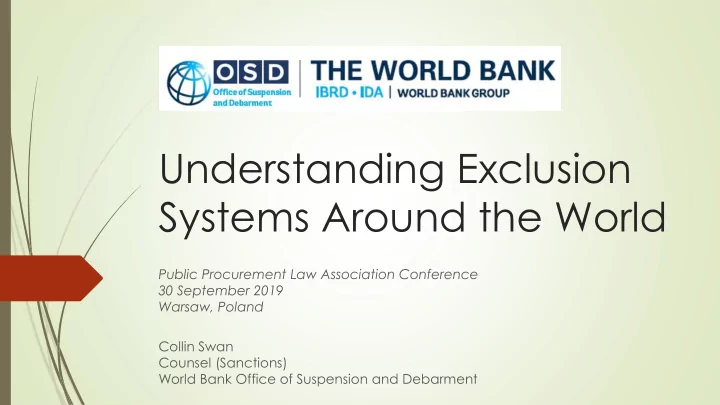

Understanding Exclusion Systems Around the World Public Procurement Law Association Conference 30 September 2019 Warsaw, Poland Collin Swan Counsel (Sanctions) World Bank Office of Suspension and Debarment
Research on Exclusion Systems Desk Reviews and Open-Data Research : • Reviewed exclusion provisions of at least 36 countries • Global Exclusion Survey : • Project of the Debarment & Exclusions Subcommittee of the International Bar • Association’s Anti-Corruption Committee Goals: • Gather knowledge and comparable data on exclusion systems worldwide • Create a consultative resource for various stakeholders • Develop a comprehensive framework of how exclusion is used worldwide • Obtain contributions from local experts, like you! •
The Global Exclusion Survey Questionnaire covers six topics: • Legal & Institutional Framework Functioning & Enforcement Substantive Grounds Scope & Effect of Exclusion Transparency Limited Scope Exclusions Pilot study conducted in 2018 (covered 11 jurisdictions ) • Next survey round launching Fall 2019 •
Exclusions and Debarment • Many terms used: “blacklist” “debarment” “sanction” “suspension” “exclusion” • “disqualification” “deselection” “ineligibility” • Two possible scenarios: Exclusion of a supplier from all (or set of) public tenders for a • specific period of time ( i.e. , “debarment”) Disqualification of a supplier from a particular tender or • procurement process ( i.e. , “disqualification”)
Why Exclude? • Many purposes to excluding: Risk mitigation / protection of public funds • Punishment • Deterrence • Integrity / Maintain public trust in government • • A system’s purpose is not always clear
Grounds for Exclusion • Many different grounds exist Common integrity-based offenses ( e.g. , fraud, corruption, etc.) • Capacity-related grounds ( e.g. , bankruptcy, poor past performance! ) • Miscellaneous grounds ( e.g. , failing to sign contract, withdrawing bid • before award) • Court Judgment v. Administrative Fact-Finding
Automatic v. Discretionary Exclusion • If an exclusion ground exists, two possibilities: Automatic – Exclusion must be imposed, no discretion • Discretionary – Exclusion may, but need not , be imposed • Other factors considered, like remedial measures, government • interest, possibility of imposing a different sanction, etc. • Could vary depending on decision-maker (court, agency official, etc.)
The World Bank’s Sanctions System • At the World Bank, sanctions = debarment (generally) A quasi-judicial process to adjudicate cases against suppliers accused • of engaging in misconduct on Bank-financed projects Administrative remedies , not criminal sanctions • Sanctions create “ negative incentives ” to discourage misconduct and • “ positive incentives to encourage prevention, remediation and rehabilitation.” Intended to “ deter but not to punish.” • • Other International Financial Institutions have similar systems ( e.g. , EBRD, ADB, AfDB, IDB, AIIB, EIB etc.)
Contractual Relationships Supplier WORLD BANK Contractor INVESTIGATIONS, Consultant AUDITS, SANCTIONS BIDDING FINANCING/ CREDIT DOCUMENTS AGREEMENT & CONTRACTS IMPLEMENTING AGENCY (Borrowing Country Government)
National Exclusion Systems • Unlike World Bank, national government is the buyer / end user • Exclusion may be one of several possible remedies • Key question – How often do exclusions actually occur (and for what purpose)? • Exclusion exists in many procurement systems
2018 Global Exclusion Survey Pilot J URISDICTIONS R EVIEWED • Key Findings: Australia • Brazil All but one jurisdiction (Australia) had some form of • • exclusion system Chile • Germany • All jurisdictions provide for some form of notice and an • Italy opportunity to respond / appeal • Spain • Many differences across systems (exclusion length, • Tunisia • grounds, process, public listing, etc.) United Kingdom • United States • European Commission • World Bank •
2018 Global Exclusion Survey Pilot Different decision-makers (several jurisdictions had multiple) • Central debarring agency ( 4 jurisdictions ) • Designated official within each agency ( 5 jurisdictions ) • Individual contracting officers ( 4 jurisdictions ) • Courts ( 4 jurisdictions ) • Provisional exclusion (“suspension”) pending investigation or • proceedings ( 5 jurisdictions ) Public listing of excluded suppliers ( 7 jurisdictions ) • Exceptions to exclusion (e.g., “emergency situations,” “public interest,” • or “urgent and compelling circumstances”) ( 3 jurisdictions )
What’s Next for the Global Exclusion Survey? Revised Survey Tool Formal launch in Fall 2019, but responses are welcome anytime! Goal – Increase participation, expand range of jurisdictions covered Go to www.worldbank.org/exclusionsurvey for more information, and to access the survey!
Lessons and Questions 14 The Purpose of the System Must Be Clear: Is the system punitive ? Or is the focus on rehabilitation/self-cleansing ? Is it focused on the past (adjudicating misconduct), or the future (looking at present responsibility)? What is the balance between deterrence and fostering maximum competition ? Is a suspension/debarment seen as a “good result” or a “bad result” ? Context Matters: Is suspension and debarment one among a number of available remedies ? Or is it your only available remedy ? MDBs: Tension between fiduciary obligations and anti-corruption “enforcement” efforts MDBs: Tension between competing legal systems/standards of member countries
Lessons and Questions 15 Practical Questions: What is the right balance between certainty and efficiency ? How many levels of review ? Who is the decision-maker ? Is authority/accountability clear? What are the grounds ? Fraud and corruption? Poor Performance? What is the evidentiary standard ? Other key criteria? What due process rights are afforded to the accused party? What are the right performance measures for the system? “gotchas” vs. “success stories”
Additional Resources 16 Global Suspension & Debarment Survey http://www.worldbank.org/exclusionsurvey World Bank Group Sanctions System Annual Report FY2018 http://pubdocs.worldbank.org/en/227911538495181415/WBG-SanctionsSystemARFY18- final-for-web.pdf The Fourth Colloquium on Suspension & Debarment (2017) Website includes written summaries and recordings of the panel presentations Fifth Colloquium scheduled for spring 2020 http://www.worldbank.org/suspensiondebarment2017 Research Paper: Does Debarring Poor Performers Mitigate Future Performance Risk? Co-authored with Belita Manka, Senior Counsel, Procurement, WBG’s Legal Vice Presidency https://papers.ssrn.com/sol3/papers.cfm?abstract_id=3287348
Recommend
More recommend